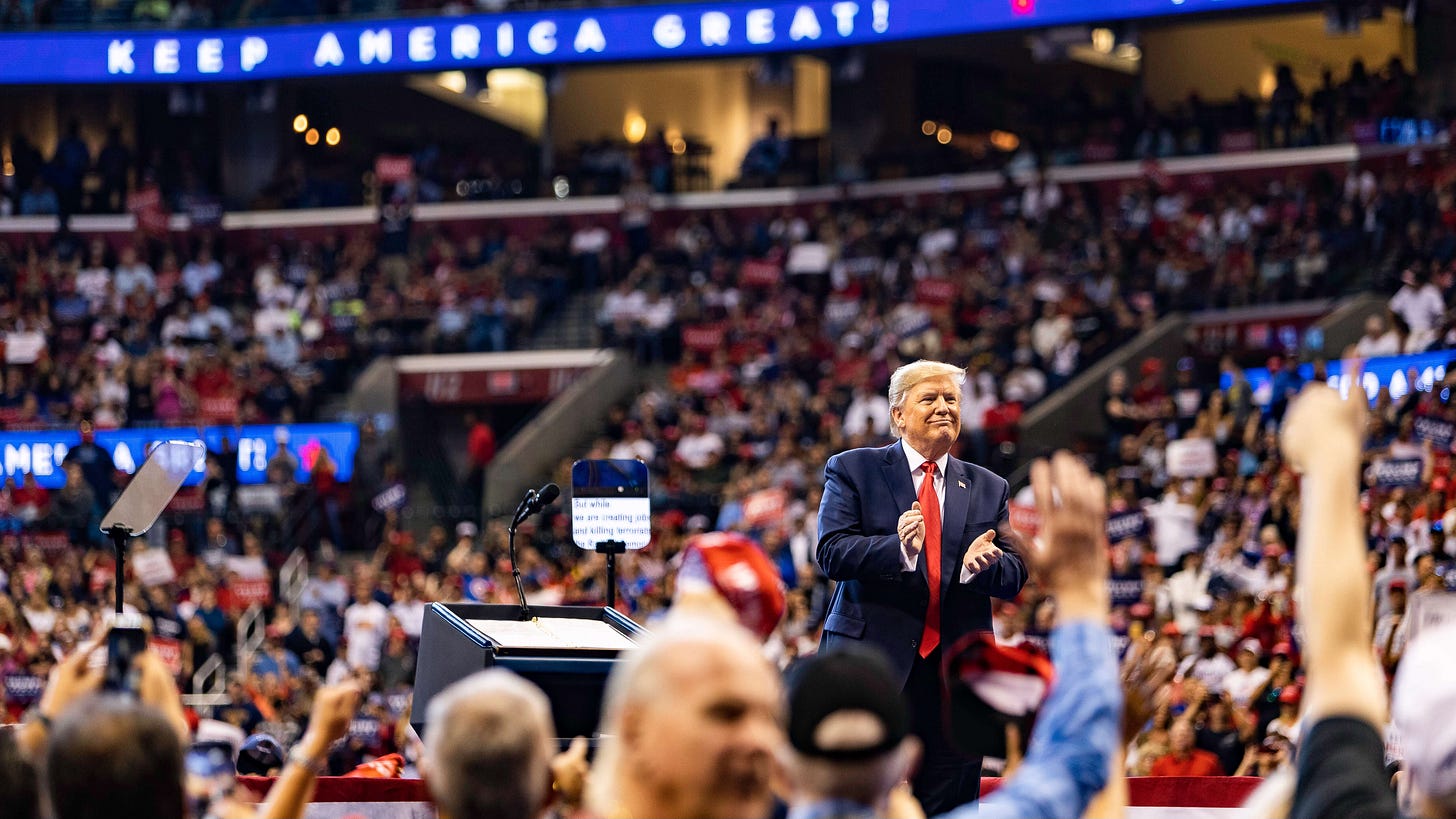Fascism is not an ideology. As Jason Stanley argues in his book How Fascism Works, fascist political structures can differ greatly in their policy goals, but nearly all follow a basic political playbook.
Politics, in this formulation, does not describe content. It describes a way of doing politics, of organizing discontent and grievance.
Fascist politics includes many distinct strategies: the mythic past, propaganda, anti-intellectualism, unreality, hierarchy, victimhood, law and order, sexual anxiety, appeals to the heartland, and a dismantling of public welfare and unity.1
All of these elements are present in what we can call Trumpism, a politics that former President and current candidate Donald J. Trump emblemizes but that has a life beyond Trump himself — which makes it all the more troubling that we seem only willing to focus on the candidate and unwilling to acknowledge that Trump’s fascism implicates his supporters.
There is a fascist impulse in the American DNA. It exists in a strand of populism2 that focuses purely on grievance and lost authority — on myth and victimhood, to use Stanley’s language. A cursory reading of U.S. history underscores this point — the slave regime in the South and its transformation into Jim Crow and the Lost Cause, the Whigs and nativism, anti-Communism, the Red Scare and McCarthyism, the structures of modern American policing, anti-Islam, and so on. Fear is centered — as race and sex and change. The aggrieved are granted their grievances, and given scapegoats to target — sparing the real wielders of power in the world, the oligarchs, from their ire. The “strong leader” steps, a captain who rights the ship, or a father who restores order in the home.
“When Dad gets home,” Tucker Carlson said last week,
“you know what he says? ‘You’ve been a bad girl, you’ve been a bad little girl, and you’re getting a vigorous spanking right now,” he said. “I’m not going to lie. This is going to hurt you a lot more than it hurts me. And you earned this. You’re getting a vigorous spanking because you’ve been a bad girl.”
Control. Corporal punishment. The naughty girl. Violence. These are themes, and they are being normalized everyday at every Trump rally.
On Sunday, Trump rallied at Madison Square Garden. Much of the post-rally focus has been on individual comments and speeches — on a racist comic who called Puerto Rico a floating garbage dump, others who referred to Vice President Kamala Harris as a prostitute. The Trump campaign distanced itself from some of the comments, though he has made similar ones over the much of his public career in and out of politics (“shithole countries”). More importantly, the speakers’ jokes and language are consistent with the campaign he has been running and the movement he has sought to lead.
Trump’s core issue is immigration, and he rarely misses an opportunity to mischaracterize the millions who have come to our shores seeking a better life. Technically, he opposes illegal immigration, but he also has spoken disparagingly about legal immigration from “no-white countries,” and views everything through the lens of identity.
Trump uses the language or war (“invasion”) and disease (“infection,” “poisoning the nation’s blood”) to describe immigrants, and has promised to deport “criminal aliens,” purposefully using a word that has fallen out of favor except among the most racist xenophobes.
Latinos are not his only target. While he is now wooing Muslim and Palestinian voters in Michigan and has praised Jews, hoping to peel away voters, his history with both groups is checkered at best. He has attacked Islam and Muslims, and trafficked in antisemitic/anti-Jewish tropes, even if he dresses them up in pretty language.
And Trump seeks to erase the distinctions between his campaign, his potential presidency, even his identity, and the nation writ large. His enemies are the nation’s enemies, and he is framing this election as one between a savior (Trump) and “the enemy from within,” which he repeated on Sunday.
“They’ve done very bad things to this country,” he said of this “enemy. “They are indeed the enemy from within. But this is who we’re fighting.”
We and they. Us and them. This is the argument Trump has been pressing since he descended down the escalator in 2015 and announced what the press assumed was a quixotic vanity run for president. Few of us took him seriously then — I didn’t, not until it was clear he could take the GOP nomination — and there are those who refuse to see him today as the threat he is.
“We were getting ready to win this election,” he said on Election Night 2020.
“Frankly, we did win this election. So our goal now is to ensure the integrity, for the good of this nation. This is a very big moment. This is a major fraud on our nation.”
Note how freely he moves between the first person and the third, the “we” and “our nation.” And remember that he spent the next two months pushing this lie until Jan. 6, 2021, when he led a rally in Washington that devolved into an insurrection as his supporters stormed the Capital building and took it over.
I was criticized for assuming the Trump MSG rally on Sunday would echo the infamous pro-Nazi rally at the Garden organized by the German American Bund. Trump is not Hitler, a classmate from high school commented on Facebook. And he’s not, and this is not 1939. But his rhetoric borrows from all of the fascist movements of the past, and recasts these arguments for contemporary America.
As the journalist Marc Cooper wrote Monday, Trump’s rally
was a frankly vile and garish display of a much larger pro-dictator movement led by a raging idiot who cannot complete a sentence but who can grunt out one violent fascist threat after another. He can speak interminably but make no sense. He can also still be elected president and that’s a lot more “historic” than the 1939 rally that went nowhere.
Trump’s language — his “revolting rhetoric” — and the briefs presented by his warm-up acts
could have been lifted word by word from Hitler or Goebbels at the Berlin Sportspalast. All you had to do was replace the Nazi speeches denouncing and dehumanizing and threatening Jews and substitute the word ‘migrants’ and you have a match.
These arguments matter. because, as Stanley told On The Media, “speaking about the world is a way of behaving in the world.”
When you describe people as vermin, you're justifying treating them as vermin. The idea of justifying a practice without engaging in that practice is well nigh incoherent. The whole reason you're justifying those practices is so you can go and do them. And the explicit labeling of political opponents as threats to the nation as an enemy within is explicit justification for targeting them with the apparatus of the state.
There is a real threat here, especially because Trump will during a second Trump term will have few constraints. He likely will own both houses of Congress, and he already owns the Supreme Court and much of the lower courts. He will not have to worry about re-election, or a free and independent press — see the Los Angeles Times and The Washington Post. The rules have been gutted, the guardrails removed, and we can expect the gloves to come off.
“Trump’s presidency,” Sidney Blumenthal writes in The Guardian, “was a rehearsal for fascism,” and his “current rage is hardly a new threat. In a second term he intends to smash through the constraints that inhibited him in his first.”
Stanley, Jason. How Fascism Works: The Politics of Us and Them, Random House, 2018, p. xv.
I consider myself a populist socialist, which I define as someone who wishes to limit elite power and pass it down to workers, consumers, and citizens so that we can move the culture forward and improve everyone’s lot. Fascism is not about the future. It is purely about reclaiming lost authority.






